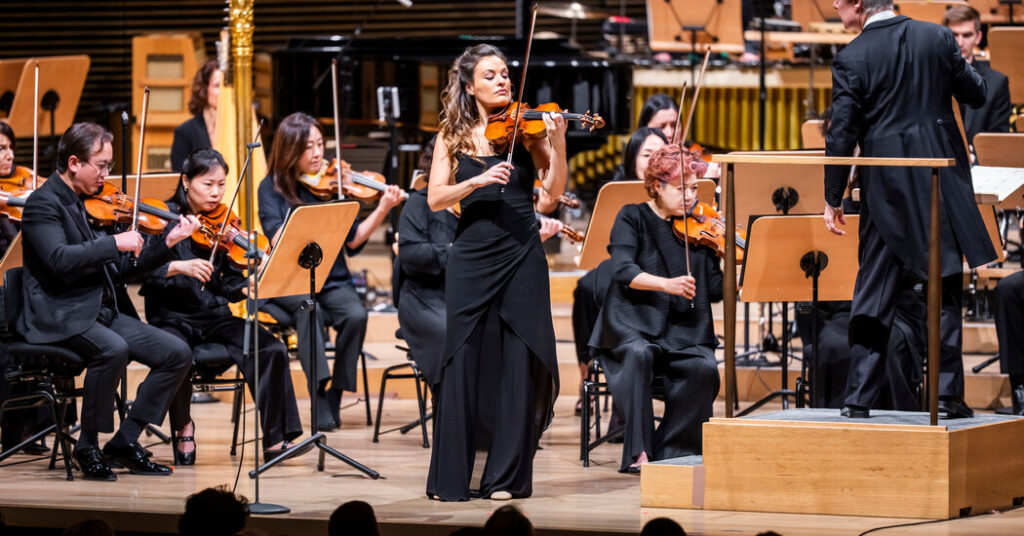In a season leading up to the 250th anniversary of the United States, the New York Philharmonic has been circling the question of American identity. Coming programs will include Thomas Adès’s apocalyptic “America (A Prophecy),” David Lang’s oratorio “the wealth of nations,” and more familiar touchstones by Dvorak, Bernstein and Gershwin.
But two recent programs tested how national character might play out in the purely instrumental realm of the violin concerto. In one, Nicola Benedetti played the jazz- and blues-inflected concerto that Wynton Marsalis wrote for her in 2015; last week, Augustin Hadelich performed Samuel Barber’s neo-Romantic pastoral from 1940. One celebrates the coexistence of distinct musical dialects; the other imagines the individual and the collective speaking as one.
Even without an explicit narrative, a concerto stages a kind of social drama: an individual voice set among many, probing the possibilities of conflict, collaboration or persuasion. Listening to the Barber on Saturday, with Hadelich as soloist and the elegant Dima Slobodeniouk conducting, I experienced its lyrical cohesion as irresistibly comforting. Barber conjures a kind of utopian community, in which the soloist and orchestra speak the same language and musical ideas are shared and affirmed by all.
It would be easy to consume music of such melodic sweetness like a narcotic. But Hadelich brought a contained urgency to his performance, with chiseled phrasing and an unwavering solidity at the core of his voluptuous sound. Barber composed parts of the concerto in Europe as his anxiety over a war that would soon pull in America deepened. And it’s possible to hear in the Arcadian glow of the first two movements a last affirmation of what the Greek philosophers believed — that the beautiful can lead toward the good. Even the final Presto, which flew past in a volley of crisp notes, projected a kind of idealistic confidence in its laserlike pursuit of the finish line.
As an encore, Hadelich offered a dazzling arrangement of Ervin T. Rouse’s bluegrass anthem “Orange Blossom Special” — a tribute to American ingenuity delivered in the vernacular.
If Barber’s concerto offers a homogenous vision, Marsalis’s Violin Concerto revels in a musical landscape defined by plurality, movement and porous borders. Different violinists have championed it in recent years, but the Scottish-born Benedetti presents it with the fierce pride of a co-creator. Marsalis credits her detailed feedback with sharpening the virtuosity of the solo part. (After two decades of friendship, they married this summer.)
I heard Benedetti’s joyous performance on Nov. 13 — interrupted by an inadvertently comic break to retune her instrument — under the direction of David Robertson, who brought a dancer’s buoyancy to the podium. Marsalis draws on jazz harmonies, blues inflections, marching-band swagger and the Scottish roots of American fiddle music, moving among them as though passing through different neighborhoods. Some critics have faulted the sprawling concerto for its lack of thematic development, but I found the clash of contrasting materials invigorating.
Marsalis has described the soloist as a traveler or preacher, by turns seducing and sermonizing along the way. That idea becomes literal in the second movement, “Rondo burlesque,” during an extended cadenza. While playing, Benedetti left her privileged perch next to the conductor and threaded her way through the orchestra ranks. In the back row, she struck up a flirtatiously competitive conversation with the percussionist Pablo Rieppi. Then she wove her way back through the violin section plucking bluegrass chords as if casting seeds.
But I was disappointed to see no discernible reaction to the subtle dramaturgy from the string players. As Benedetti passed by, the violinists sat motionless, eyes trained on their music stands, like sailors on Odysseus’ ship, ears plugged with conservatory wax against the siren song. The tableau undermined an otherwise vivacious and committed performance that offered plenty of evidence of the Philharmonic’s ability to shake off classical conventions.
In another choreographed instance, the lower brass rose to their feet for a raucous Mardi Gras salvo; the beginning of the fourth movement had everyone stomping and clapping in rhythm. But by remaining physically impervious during Benedetti’s ambulant cadenza, the string players projected the very rigidity that Marsalis’s concerto tries to dislodge.
The concerto ended with a final theatrical gesture: a high, flutelike tune that Benedetti played while walking offstage, repeating it until it felt like a fragment of birdsong or the start of an earworm. In its inconclusiveness, the ending felt quietly radical. The conversation between the nation’s musical constituencies, Marsalis seems to say, is a continuing thread.
It may seem churlish to linger on the optics of the string players during an extended rest. But now that Geffen Hall has rows of audience members embracing the stage, the orchestra draws the eye as much as the ear. In a season that asks what American identity sounds like — and in an institution eager to be taken seriously in the broader social conversation — the way musicians inhabit a shared space matters. In works that imagine the ensemble as a community responding to a solitary voice, they model, even in stillness, how a community hears and responds to difference.
The post Considering the American Character in Two Violin Concertos appeared first on New York Times.




